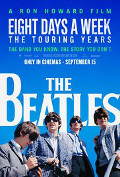
Directed by
Ron Howard
138 minutes
Rated PG
Reviewed by
Chris Thompson


The Beatles: Eight Days a Week - The Touring Years
Synopsis: Focusing on the years 1962-1966, this documentary by Ron Howard explores The Beatles’ most active touring period and how John Lennon, Paul McCartney, George Harrison and Ringo Starr came together and navigated their rise as a global phenomenon. The inner workings of the band – from creating music, making decisions, and how the members’ varied personalities and musical talents converged into a perfect storm uniquely poised to result in the sensation that was Beatlemania – are explored in detail on the journey from Liverpool’s Cavern Club to the Beatles’ last concert in San Francisco’s Candlestick Park.You could probably be forgiven for thinking that everything that can be said about the Beatles has already been said. But then Ron Howard comes along with a documentary that assembles an extraordinary range of rare footage, restored footage, fan footage and present-day interviews to document the period of 1962 to 1966 when the Beatles were a ground-breaking live band.
In addition to the two surviving Beatles, now in their seventies, the film features a host of present-day interviews with well-known figures for whom the Beatles were a great influence, sometimes in surprising ways. The line-up includes the likes of Whoopi Goldberg (who tells a great story about her own Beatles experience), Elvis Costello, Eddie Izzard, Sigourney Weaver (complete with an archival clip of her teenage self, shouting hysterically in a Beatles concert audience) as well as film director Richard Lester (who made their first two films, A Hard Day’s Night,1964 and Help! 1965).
The music, of course, is great and the scenes of hysteria are jaw-dropping even though we’ve heard and seen it all a hundred times before. But it’s the unexpected revelations that make this a doco well worth seeing: the band’s insistence that their audiences in the deep South during the Civil Rights’ movement be integrated: the fact that they were the first band to play stadium concerts, when no proper sound systems existed, These are the things that bring a freshness to Eight Days A Week. And when the teenage hysteria obliterates any possibility that their music might be heard, let alone appreciated, it’s not hard to sympathise with the band’s decision to give up touring in favour of more focused time in the studio recording albums. And aren’t we glad they did!?
I’ve always admired Ron Howard’s ability to take a story like Apollo 13 where we know they don’t die in the end (sorry if that’s a spoiler) and turn it into an incredibly tense and thrilling movie. He’s been quoted as saying he needed to bring the same approach to this documentary. And he succeeds. In his hands, a story where we (think we) know the end becomes a new and engaging insight into one of pop music’s most enduring cultural phenomena.
And if you’re in the mood for more, stick around after the credits for an additional 32 minutes of restored concert footage from the Beatles iconic 1966 Shea Stadium concert. For me, though, it seems an odd idea to include it in the screenings, given the doco has taken us right to the band’s final live performance on the roof of their Apple Corps building in 1969. With the exception of diehard fans, it might be better left for the DVD extras where it feels like it would be more appropriate.
Want something different?





